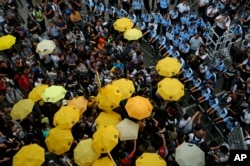Activists who helped start the 2014 Umbrella Movement protests in Hong Kong go on trial Monday.
Benny Tai, Chan Kinman and Chu Yiu-ming face charges, including plotting and inciting to carry out a public nuisance, as well as “incitement to incite” a public nuisance.
The three defendants face up to seven years in prison.
The three are described as being the first to propose in 2013 what later became called the Umbrella Movement. The movement was then called “Occupy Central with Love and Peace.”
The protestors were partly influenced by the “Occupy Wall Street” movement in New York City at about that time.
The Hong Kong activists were seeking to increase openness in the city’s process for electing high officials. They also wanted mainland China to keep its promise to permit greater voting rights.
Chan said the group did not expect to face serious charges. He said past activists who took similar action had faced charges related to gathering large groups.
“They would just be charged for unauthorized assembly or participation in unlawful assembly,” Chan said.
Chan said he did not expect charges that can carry so much prison time.
Chan and Tai are both established college professors and Chu is a Baptist minister. They are unlike other young activists in the Umbrella Movement, such as Joshua Wong who became world famous at the age of 18.
Wong has expressed concern about the three men. He noted that they became democracy activists before he was born. He said he was especially worried about Chu, who is in his seventies.
The three will be tried along with six other defendants who face similar charges. These include legislators Tanya Chan and Shiu Ka-chun.
The media has called the whole group, the “Umbrella Nine.”
Hong Kong’s Department of Justice said the trial is opening four years after the protests because of its complexity and the amount of evidence involved.
The department said it would not comment on the charges against the nine. It also said it did not know the number of people who faced charges as a result of the protests.
The demonstrations in 2014 took place in several areas of Hong Kong for 79 days. Activists were seeking direct election of the city’s top leaders and full voting rights for citizens by 2017. Mainland China had promised Hong Kong the expanded rights as part of the plan that returned the city to Chinese control.
About 220 protestors linked to the Umbrella Movement have faced charges since the end of 2014. One rights activist’s list says that 78 have been found guilty.
Protest leaders Nathan Law, Alex Chow and Joshua Wong are the best-known activists to face trial. At first, they were sentenced to community service. An appeals court later changed their sentences to six to eight months in jail. Hong Kong’s Court of Final Appeal cancelled that ruling in February.
Chan said he hopes something similar will happen to the Umbrella Nine.
“The Court of Final Appeal had already made a ruling saying as long as people act out of conscience and as long as people are not involved in violence they shouldn’t be sent to jail,” Chan said.
Chan added that judges in the lower courts can have very different opinions. Those decisions can be changed by higher courts. “But you know, for the appeal process, it can take years,” he said.
I’m Mario Ritter.
Erin Hale reported this story for VOA News. Mario Ritter adapted it for VOA Learning English. Caty Weaver was the editor.
_____________________________________________________________
Words in This Story
nuisance –n. something that is annoying or that causes trouble or problems
unauthorized –adj. without permission, not authorized
participation –n. the act of taking part in something
conscience –n. the part of the mind that makes you aware of your actions as being either morally right or wrong
We want to hear from you. Write to us in the Comments section, and visit our Facebook page.






